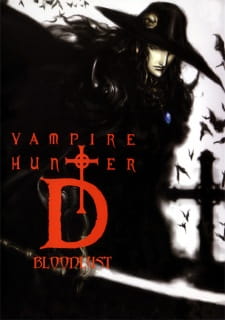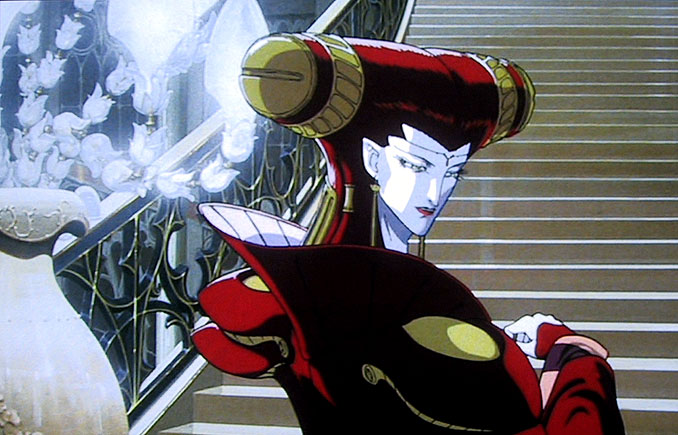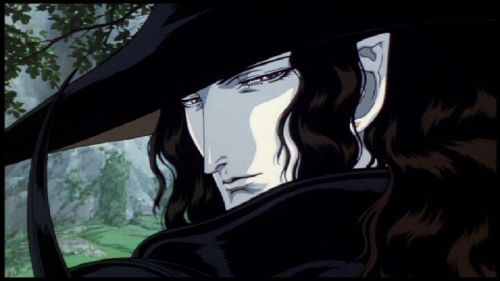Charlotte Elbourne has been kidnapped by the vampire Meier Link. Her father, desperate to see his daughter returned to him has called upon the services of the most dangerous vampire hunter ever to walk the earth. His name is D. It is D’s mission to rescue Charlotte and bring her back to her father. This time however, D has some competition. While D's reputation precedes him, the Marcus Brothers are regarded as the best of the best. They've killed hundreds of vampires and they have never failed a single mission. Yet still, there is more to this kidnapping than our would-be heroes know. It is a race against time as D competes with rival hunters, the powerful Meier Link, and his own nature.
Vampire Hunter D: Bloodlust is an elegantly woven tale that continues the exploits of one of the most enigmatic characters of all-time. It also improves upon the original by providing a deeper view into D’s personality, showing us how D relates to the world around him, and even greater variety in how other characters in this world see D and his kind. The interplay of good and evil in the central confrontation also takes forms not often seen in the genre.
Bloodlust explores the relationship between Charlotte, Meier, and D. If any approximation can be made of Charlotte's and Meier's situation it would be they are star-crossed lovers, and D is willing to destroy what ever bond they think they have. In D's eyes vampires are an abomination, and the very thought that love can bloom between a human and a vampire is not only incredulous but something D sees as impossible.
Bloodlust shares the techno-frontier setting familiar to the novel and 1985 film. The environments are created with such stunning attention to detail that it's easy to believe one can touch them. Whether the characters are in small towns, forests, glades, or castles everything is simply stunning and it's truly a feat of animation as quite simply there isn't a single anime on the market that looks even half as good as this. The clothing effects, hair movement, rippling grass, flowing streams of water, even the characters' reflections are a testament to Japanese animation and it looks like you're watching a moving painting.
Similar to the art and animation, the voice acting in the film is in a class of its own. Bloodlust wasn't dubbed in Japanese then re-dubbed with an English translation when it first released. Rather, the English dub came first and the script and animation was made with the English voice acting in mind. There is no noticeable delay in lip-synching, the dialogue is written very well, and conversations flow naturally between characters, not just because of a solid script but because the conversations themselves are delivered by an amazing cast who keep the personalities of their characters at the forefront of their performance.
Wendee Lee is no stranger to voice acting and she delivered a knockout performance as Charlotte Elbourne. While she shares the spotlight with lesser known voice actors their performance is nothing short of incredible.
Meier Link was voiced by John Rafter Lee who conveyed the regal dignity of a classical vampire. In addition, he was also able to capture a certain emotional quality of the loneliness some vampires feel after living so long and becoming disenchanted with eternal life.
Pamela Adlon does a good job portraying Leila as an extremely headstrong hunter. This woman is tough as jerky and harbors an intense hatred of vampires. This hatred seems to waver albeit slightly after meeting D, and Adlon did an smashing job to portray the ebb and flow of Leila’s emotions.
Andrew Philpot however steals the show. His lines though few, speak volumes of D's character. Philpot has a deep, almost darkly melodic voice which helps to tell D's story in its own right. Philpot balances D's angst with the character's determination and sense of purpose. D is thought to be an emotionless character but this has always been due to the fact that D believes actions speak louder than words. However, Philpot's performance gives a view into not only who D is but what D has been through. It's one thing to give us the idea of a character, it's another matter entirely to help us understand what makes the character what it is, and Philpot does this exceedingly well.
Vampire Hunter D: Bloodlust brought anime into the the new millennium with style, depth, and intensity on a level that few if any anime can match. Even if you've never been a fan of Vampire Hunter D or anime in general, every movie lover owes it to themselves to see this title. It's half animated and half amazing.













